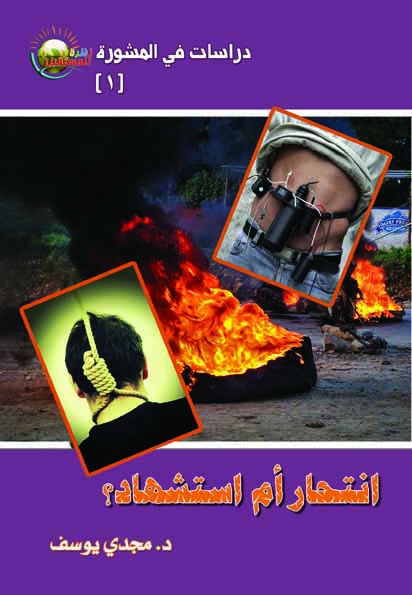Counseling Curricula
When pressures and problems grow, people need someone to stand by them, to listen, and to bring God's Word. This kind of faithful counsel can be like a candle lighting their way amid the harsh and difficult conditions of darkness that cover the roads of their lives. Vision for the Future's counseling curricula is intended to be this, and to help believers play such a role.
What are you afraid of?
Author: Dr. Magdy Youssef
Publisher: Vision For Future
God created man with a survival instinct that enabled him to sense the danger of predators and to run away with his life. Were it not for this fear, none of our ancestors would have survived. However, the most important cause of our fear of mortality is the ignorance of the nature of things. When one fears darkness it is because one does not know what he might face. One of the most erroneous beliefs about courage is that it is the absence of fear. But this is not true. Courage is the ability to keep pressing on, despite one's fear. Fear brings you to a halt, whereas courage encourages you to go on.
For this reason, Dr. Magdy Youssef tackles the topic of fear throughout his book, Afraid of What? He treats different aspects of fear throughout its 180 pages, seeking to guide readers to rid themselves of this virus that has ruined many people's lives, and has led to many wrong and devastating decisions for individuals and families.
In this medium sized book, we become acquainted with the definition and phenomenon of fear. To quote the author: "Psychologists defined fear as an irrational anxiety, rampantly prevailing over those who suffer with fear in unusual, uncontrollable, and apprehensive ways. The notion of fear is a concept that has been argued over in both old and modern schools of psychology. The old view considered fear as a human instinct, while modern psychology treats it as an intrinsic tendency, having a vital function of protecting man from threats and risk factors." So, fear is most often associated with a situation, concrete or abstract, which involuntarily turns into a source of fear for an actor, followed by a state of surrender.
Dr. Youssef goes on to answer the question of whether fear is a psychological disorder, talking about the role of fear in shaping personalities, and addressing the sources of our fears. He categorizes not less than twenty types of fear, including: the fear of change ("leaving one's comfort zone"), the fear of aging ("Gerascophobia"), childhood fears, the fear of sexual harassment, the fear of staying single ("Anuptaphobia"), the fear of losing one's virginity ("Primeisodophobia"), the fear of sexual impotence, the fear of envy, the fear of taking decisions, the fear of failure ("Atychiphobia"), and the fear of rejection ("social anxiety").
One of the most frequently used words in the modern vocabulary is the word: "Phobia." But what is a phobia? Dr. Youssef says, "Every person has their own anxieties, varying in degrees. For some people, these reach a level of overwhelming and persistent irrational fear. This is what we call a "Phobia." Surprisingly, every phobia has its own cause and name. Among the types of phobia are: the fear of youth ("Ephebiphobia"); the fear of sleeping ("Somniphobia"); the fear of vomiting ("Emetophobia"); the fear of working ("Ergophobia"); the fear of colors ("Chromophobia"); and the fear of mirrors ("Spectrophobia").
Next, the author shifts to a scientific approach to fear, referring to the physiological and chemical changes that occur in the body when a person is afraid. In this section, he tackles the "anxious personality" and addresses the question of whether certain personality types are more susceptible to pathological fear than others. He draws attention to the clear distinction between fear and anxiety, saying: "fear and anxiety are normal reactions that may be helpful in certain situations we face. However, symptoms of anxiety disorder vary greatly from those feelings of natural worry associated with specific situations. Anxiety disorders require the intervention of a psychiatrist, since it is neither natural nor helpful."
Symptoms of anxiety disorders covered by the author include panic disorder and obsessive compulsive disorder (OCD).
But is there any hope of getting rid of our fears? The author says: "I am trying to present some of the ways our fears can be controlled. As many have said, 'Fear is treated by facing it, not by giving in to it.' The more a person succumbs to fear, the more it possesses him, acutely rendering it difficult to be cured." So, how do we face those fears?
- Identify your fears
- Change your mindset
- Change your attitude
- Change your language
- Learn the art of confrontation
- Free your body
In closing this section, the author compels the reader, in definitive terms: "Do not allow fear to defeat your life, causing you to lose peace and stability. Do not let panic and fear control your life. You may have lost in the past because of fear. What you need now is to deal with fear, and not merely run from it. Contend till you break free. Believe me, you can live free of fear."
"But how?" we ask. "Come to God with your fears." He alone is able to deal with all that intimidates us in this life. The Bible does not say, "Do not be terrified," or "Do not be fainthearted" but it says, "Do not fret," which means, do not escape or run away. Rather, attack your enemy, "Fear," by resorting to God, and seeking his help. You will find out that facing your fears wasn't as terrible as you imagined. You will come to see that your enemy wasn't worth of such fear.
The author ends with a final challenging critique: Despite knowing that God loves you, you may still be a person who frets. If so, you now have the opportunity to know and experience even more about God's love for you, because perfect love, the kind that God has for you, casts out all fear. "Trust.... for God loves you... Are you still afraid?"





